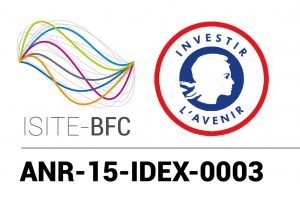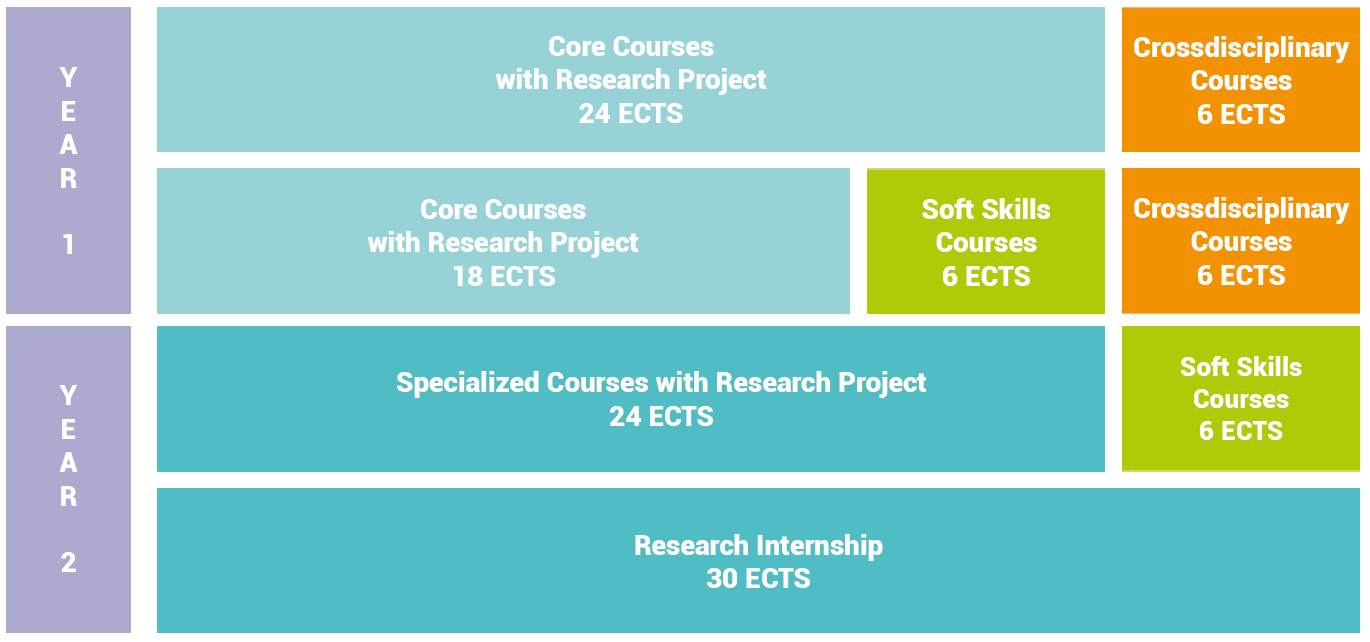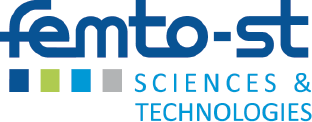Innovation through
Physics and Engineering
Innovation through Physics and Engineering
Innovation through
Physics and Engineering
Innovation through Physics and Engineering
 Master in Computational Physics (CompuPhys)
Master in Computational Physics (CompuPhys)The CompuPhys Master provides a comprehensive program in fundamental physics (quantum physics, light-matter interaction, condensed matter physics), in numerical simulation methods and in data sciences. Concrete applications to physics of life, to astrophysics, to physics of the atmosphere and of the environment, and to quantum information, are studied in the training program. A large part of the program is dedicated to active learning methods (practice-based learning, project-based learning, problem-based learning and flipped classroom) and the use of digital tools. The goal of the Master’s program is to train physicists with high skill level in numerical methods, programmers specialised in numerical simulations of physical systems, and data scientists specialised in physical data issued from sensors and networks of physical devices..
The scientific studied fields concern matter and light-matter interaction physics, numerical simulations and big data for physical systems. The training program has two goals: to train physicists with a high skill level in computational methods able to adapt to any future evolution and disruption induced by the digital technologies; and to train digital engineers with a high skill level in physics able to integrate a research team in a university or an academic research institute, a R&D department of the industry in order to connect computer engineers to physicists of the other specialties.
The numerical approaches are transversally used in all domains of physics permitting to address several domains during the training program: condensed matter, molecular physics, spectroscopy, quantum information, theoretical physics, astrophysics, life physics, atmospheric physics. This objective is achieved by academic courses but also by the large part of the teaching organised as numerical projects or as problem-based learning. These numerical projects (one by semester), the courses by problem-based learning and internship activities are adapted to each student with respect to his professional project and his personal interests, permitting a specialisation in a specific domain of physics or a deepening of the digital skills.
Concerning the digital skills, the training program involves both the big data aspects and the numerical simulation methods, in order to cover the whole of the computational approaches: ab initio simulations; physical data collection, processing and analysis; comparison of observation and experiment results with reference digital models. The development of the digital industries needs data scientists specialised into data collected from physical sensors and/or from networks of physical devices. This is the case for example of the internet of things, of eHealth (with also the use of physics of life skills), and of climatic data analysis. In fundamental scientific research domains as in astrophysics where observation data are processed, numerical simulations play a fundamental role. In a lot of industries and scientific researches, numerical simulations are performed as for example in materials industries, in pharmaceutical industries (where molecular dynamics simulations are used to search new active molecules or to improve the efficiency of an active molecule), in aerospace industries and in celestial mechanics researches, and in theoretical physics (fundamental quantum mechanics and general relativity).
The Master’s program includes also a training concerning the tools of the dynamical systems and the network theories which are at the intersection of the data science and of numerical simulation science. The latter presents a universal application from physical to social systems. Moreover, the Master’s program includes a training about quantum information theory. Some quantum technologies are today in expansion and quantum computing is certainly the future of the digital industry. The Physics & Computational Physics Master program wants to be a training in the present-day higher technologies (numerical simulations, big data) and will prepare the students to the forthcoming technologies (quantum computing).
To achieve these goals, the training program is organised into three scientific blocks (quantum physics, light-matter interaction, condensed matter physics), three technical blocks (numerical simulations & dynamical systems, algorithmics & programming, big data) and two soft skills blocks (digital humanities, numerical projects & internship activities). In addition some external facultative activities are proposed to the students, as scientific seminars organised by the partner laboratories, a traineeship of astronomical observation technics, or the participation to an eHealth hackathon for example.
The CompuPhys master’s program takes place over 2 academic years divided into 4 semesters. Each semester corresponds to an accreditation of 30 ECTS, which leads to a total at the end of 120 ECTS. The program has an extensive international flavor, with all courses taught in English, except two modules of 3 ECTS in semesters 1 and 3 that will introduce French culture and language for foreign students, and organized in close connection with another master’s programs. We offer the opportunity to obtain French language certification (B2 at minimum). The teaching staff are highly qualified researchers with international recognition.

| Master 1 Fall Semester | Master 1 Spring Semester |
Quantum Physics (4 ECTS, 30h lectures/exercices, 10h practical) Condensed Matter Physics (4 ECTS, 22h lectures/exercices, 18h practical) Statistical Physics (4 ECTS, 30h lectures/exercices, 10h practical) Algorithmics & Programming: Python, Fortran, Matlab (5 ECTS, 12h lectures/exercices, 39h practical) Signal Processing, Statistics and Big Data (5 ECTS, 23h lectures/exercices, 24h practical) Soft Skills 1 : communication & deontology (3 ECTS, 18h) English or French (3 ECTS, 24h) Numerical project 1 (2 ECTS, 2 weeks) | Quantum Optics and Light-Matter Interaction (4 ECTS, 40h lectures/exercices) Laser Physics (4 ECTS, 31h lectures/exercices, 9h practical) Molecular Spectroscopy (4 ECTS, 40h lectures/exercices) Condensed Matter Physics (4 ECTS, 31h lectures/exercices, 9h practical) Numerical Simulations & Dynamical Systems (4 ECTS, 15h lectures/exercices, 25h practical) Databases SQL (1 ECTS, 3h lectures/exercices, 6h practical) Soft Skills 2 : digital security, digital rights, peer production, software factory, epistemology (3 ECTS, 18h) Numerical Project 2 & Laboratory Project (6 ECTS, 2 days a week) |
| Master 2 Fall Semester | Master 2 Spring Semester |
Quantum Optics (4 ECTS, 40h lectures/exercices) Quantum Physics (4 ECTS, 18h lectures/exercices, 22h practical) Applied Spectroscopy : atmospheric sciences & astrophysics (4 ECTS, 34h lectures/exercices, 6h practical) Numerical Simulations, Dynamical Systems & Networks Analysis (6 ECTS, 30h lectures/exercices, 35h practical) Astronomical Data Processing & Imaging Sensors (2 ECTS, 9h lectures/exercices, 6h practical) Machine Learning (1 ECTS, 10h practical) Parallel & GPU programming, multi-physics computation (3h ECTS, 9h lectures/exercices, 21h practical) English or French (3 ECTS, 18h) Numerical project 3 (3 ECTS, 1 day a week) | Research Internship hzsrthsrkgiklgqsdghqthtrhsrthzrthzrthzrthlggetzeretrttzertyzrtrzthzrthhrthzrthrtjkgjtatergqregqerghsrthsrths |



After the Master, students can postulate to the jobs of engineer in computational science, of programmer – physicist specialised in numerical simulations, of data scientist physicist. They can integrate at the issue of the program a technical department of a company, an academic laboratory of a university or a public research institute. They can have also the opportunity to prepare a PhD thesis in physics in an academic laboratory.
The applicant students must be holder of a Bachelor’s degree in physics, Bachelor’s degree with major in physics and minor in mathematics, computer science or chemistry, or Bachelor’s degree with major in mathematics or computer science and minor in physics. B2 level TOEIC (or equivalent) in English and practical knowledge of computers are needed.
Many scholarships will be awarded each year to high quality foreign students.
Besançon is a historical town with a strong university community, and is consistently voted as having an excellent quality of life. It is home to a UNESCO-World Heritage listed citadel and fortifications, and is well known for its proximity to an excellent range of outdoor pursuits including hiking, mountain-biking, skiing and rock-climbing.
The site of training is Besançon, a French old city that combines old stones buildings, French culture, various activities from sports to cultural, and students life.
Approximately 10% of the population are students or interns in Besançon city and in its agglomeration.
The center of applied languages (CLA) which is a part of the university is one of the most important center for learning languages in France and hosts approximately 4000 interns per year coming from various countries for some days or for several months.
Public transportation is very practical and the old-city is doable by walks.
Contact: Julien Montillaud